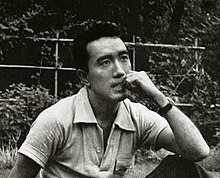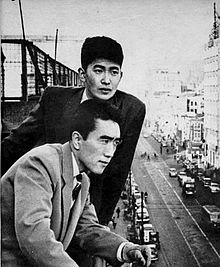Yukio Mishima
Mishima Yukio (Japanese 三島 由紀夫; in German Yukio Mishima; * 14 January 1925 in Tokyo as Hiraoka Kimitake (平岡 公威); † 25 November 1970 ibidem) was a Japanese writer, poet, playwright, director, actor, model and political activist. Mishima wrote novels, screenplays, plays, short stories, poetry, and a libretto, and is considered one of the most important authors of the 20th century.
His avant-garde works are characterized by a wide vocabulary, multi-layered metaphors, the fusion of traditional Japanese with modern Western literature, and his obsession with the unity of beauty, eroticism, and death.
In addition to his work as a contemporary author of postwar Japanese literature, Mishima was also a nationalist political activist and founded the Tatenokai (楯の会), a private militia. He rejected the increasing Western materialist influence on Japan and was an avowed opponent of globalist aspirations, communist movements, and the New Left. He was impressed by ideas of Japanese nationalism such as kokutai ("people's character") and yamato-damashii ("people's spirit"), as well as the cultural expressions of the Shintō, which he saw threatened by the popularization of Western currents, and expressed concern for an identity for the Japanese people as a whole.
On November 25, 1970, he and four members of the Tatenokai attempted a coup on the military headquarters with the aim of abolishing Japan's constitution and restoring the power of the Japanese emperor. After this failed, Mishima committed ritual suicide. The coup subsequently became known worldwide as the "Mishima Incident."
His oeuvre includes the novels Confessions of a Mask (仮面の告白), The Sound of the Waves (潮騒), The Temple Fire (金閣寺), The Sailor Who Betrayed the Sea (午後の曳航), as well as his autobiographical essay Sun and Steel (太陽と鉄). His magnum opus came between 1965 and 1970 in the form of the novel tetralogy The Sea of Fertility (豐饒の海). Mishima was to be the first Japanese author to be awarded the Nobel Prize for Literature in 1968. However, the prize was withdrawn before it was awarded for political reasons. To honor his life's work, the Mishima Prize was established in 1988 and has been awarded annually since.

Yukio Mishima 1956

Signature
Family
Grandparents
- Grandfather: Sadatarō Hiraoka (1863-1942)
- Grandmother: Natsuko Hiraoka (1876-1939)
Parents
- Father: Azusa Hiraoka (1894-1976)
- Mother: Shizue Hiraoka (1905-1987)
Siblings
- Brother: Chiyuki Hiraoka (1930-1996)
- Sister: Mitsuko Hiraoka (1928-1945)
Other relatives
- Uncle: Hashira Hashi (1884-1936)
Marriage
- Wife: Yoko Sugiyama (1937-1995)
- Daughter: Noriko Hiraoka (* 1959)
- Son: Ichiro Hiraoka (* 1962)

Mishima (below) with Shintarō Ishihara (1956).
Works (selection)
Novels
- 1948 Tōzoku (盗賊, Eng. Thieves)
- 1949 Kamen no Kokuhaku (仮面の告白)
- Confession of a Mask. German translation from the English by Helmut Hilzheimer, Rowohlt Verlag GmbH, 1964. ISBN 3-499-15652-0.
- Confessions of a Mask. German direct translation from the Japanese by Nora Bierich, Kein & Aber, 2018. ISBN 978-3-0369-5784-5.
- 1950 Ai no kawaki (愛の渇き)
- Liebesdurst. German translation by Josef Bohaczek, Frankfurt: Insel Verlag, 2000. ISBN 3-458-17010-3.
- 1950 Ao no jidai (青の時代)
- 1950 Jumpaku no yoru (純白の夜)
- 1951 Natsuko no bōken (夏子の冒険)
- 1951-1953 Kinjiki (禁色)
- Forbidden Colors. English translation by Alfred H. Marks, Secker & Warburg, 1968 (vol. 1), Berkley Publishing, 1974 (vol. 2). (see also: Butō)
- 1953 Nippon-sei (にっぽん製)
- 1954 Shiosai (潮騒)
- The Surf. Translation by Gerda von Uslar and Oscar Benl, Rowohlt Verlag, Hamburg, 1959
- The Sound of Waves. English translation by Meredith Weatherby, Alfred A. Knopf, New York, 1956
- 1956 Kōfukugō Shuppan (幸福号出帆)
- 1956 Kinkakuji (金閣寺)
- The Temple Fire. List, Munich, 1961 (see also: Kinkaku-ji).
- The Golden Pavilion. Translated from the Japanese by Ursula Gräfe. Kein & Aber, Zurich 2019, ISBN 978-3-0369-5807-1
- 1957 Bitoku no yoromeki (美徳のよろめき)
- 1958-1959 Kyōko no ie (鏡子の家)
- 1960 Ojōsan (お嬢さん)
- 1962 Utsukushii hoshi (美しい星)
- 1963 Ai no shissō (愛の疾走)
- 1963 Gogo no eikō (午後の曳航)
- The Sailor Who Betrayed the Sea. Translation by Sachiko Yatsushiro, 1970
- The Sailor Who Fell from Grace with the Sea. English translation by John Nathan, Alfred A. Knopf, 1965.
- 1963 Nikutai no gakko (肉体の学校)
- 1964 Kinu to meisatsu (絹と明察)
- 1966 Fukuzatsu na kare (複雑な彼)
- 1966 Yakaifuku (夜会服)
- 1967 Utage no Ato (宴のあと)
- After the Banquet. Translation by Sachiko Yatsushiro, Reinbek, Rowohlt, 1967.
- 1968 Inochi urimasu (命売ります)
- Life for Sale. Translated from the Japanese by Nora Bierich. Kein & Aber, Zurich 2020. ISBN 978-3-0369-5824-8.
- 1965-1970 Hōjō no umi (豊饒の海), German: Das Meer der Fruchtbarkeit, consisting of the four novels:
- Haru no Yuki (春の雪), Snow in Spring. German translation from the Japanese by Siegfried Schaarschmidt. Munich:, Hanser 1985. ISBN 3-446-14395-5
- Homba (奔馬), Under the Storm God. German translation from the Japanese by Siegfried Schaarschmidt. Munich: Hanser 1986. ISBN 3-446-14628-8.
- Akatsuki no Tera (暁の寺), The Temple of Dawn. German translation from the Japanese by Siegfried Schaarschmidt, Munich: Hanser, 1987. ISBN 3-446-14614-8.
- Tennin Gosui (天人五衰), The Angel's Death Marks. German translation from the Japanese by Siegfried Schaarschmidt. Munich: Hanser, 1988. ISBN 3-446-14615-6.
Narratives
- 1938 Sukampo (酸模)
- 1940 Damiegarasu (彩絵硝子)
- 1941 Hanazakari no mori (花ざかりの森, The Forest in Full Bloom).
- 1942 Ottō to maya (苧菟と瑪耶)
- 1943 Daidai ni zansan (世々に残さん)
- 1944 Yoru no kuruma (夜の車), later renamed (中世に於ける一殺人常習者の遺せる哲学的日記の抜粋)
- 1945 Esgai no kari (エスガイの狩)
- 1946 Tabako (煙草)
- 1947 Yoru no shitaku (夜の仕度, Eng. Preparation for the Night).
- 1949 Magun no tsūka (魔群の通過)
- 1949 Hōseki Baibai (宝石売買).
- 1953 Radige no shi (ラディゲの死)
- 1961 Yūkoku (憂国)
- 1966 Eirei no sei (英霊の聲)
- 1969 Ranryō'ō (蘭陵王)
Stage Works
- 1948 Shishi (獅子). After Euripides Medea.
- 1956 Rokumeikan (鹿鳴館)
- 1956 Kindai nōgakushū (近代能楽集)
- Five Modern Nō-Plays. Published in German in 1962 as a Rowohlt paperback entitled Sechs moderne No-Spiele (the 1953 play Die Damasttrommel was included). Adapted from the version by Donald Keene, translated from the English by Gerda v. Uslar, includes the plays:
- Kantan (邯鄲, The Dream Pillow)
- Aya no tsuzumi (綾の鼓, The Damask Drum)
- Sotoba komachi (卒塔婆小町, The Hundredth Night).
- Aoi no ue (葵上, The Lady Aoi)
- Hanjo (班女, The Exchanged Fans)
- Dōjōji (道成寺, face in the mirror).
- Yuya (熊野)
- Yoroboshi (弱法師)
- 1958 Shōbi to kaizoku (薔薇と海賊)
- 1960 Nettaiki (熱帯樹)
- 1961 Tōka no kiku (十日の菊)
- 1965 Sado kōsaku bujin (サド侯爵夫人) (Madame de Sade), translated into English by Donald Keene; translated from English into German by Elisabeth Plessen.
- 1966 Sei Sebastian no junkyō (聖セバスティアンの殉教) [translation of Gabriele D'Annunzio's Le Martyre de Saint Sébastien, co-authored with Ikeda Kōtarō 池田弘太郎]
- 1967 Suzakuke no metsubō (朱雀家の滅亡)
- 1968 Waga tomo Hitler (わが友ヒットラー)
- 1969 Chinsetsu yumiharizuki (椿説弓張月, 3 acts, 8 acts, adaptation of a work by Kyokutei Bakin for the Kabuki).
Reviews and miscellanies
- 1955 Shōsetsuka no kyūka (小説家の休暇)
- 1958-1959 Fudōtoku kyōiku kōza (不道徳教育講座).
- 1960 Ratai to ishō (裸体と衣裳)
- 1964 Watashi no henreki jidai (私の遍歴時代)
- 1967 Taiyō to tetsu (太陽と鉄)
- Sun and Steel. English translation by John Bester, Kodansha International, Tokyo, 1968. ISBN 4-7700-2903-9.
- 1967 Hagakure Nyūmon (葉隠入門)
- Towards an Ethics of Action. Introduction to Hagakure. Hanser Verlag, 1987.
- 1968 Bunka bōeiron (文化防衛論)
Other
- 1947 Misaki nite no mongatari (岬にての物語, A Story at the Cape).
- 橋づくし, (Hashizukushi, The Seven Bridges), 1958. Published in the Merian Tokyo issue of February 2, 1972, issue 2/XXV.
- The youth who wrote poems [or, The boy who wrote poems]. Short story. Strictly limited and authorized edition with lithographs by Arno Breker, Bonn 1976.
- Yukio Mishima: Collected Stories. Rowohlt, 1971. ISBN 3-498-09280-4
- Yukio Mishima 三島 由紀夫: Der Junge, der Gedichte schreibt (The Boy who writes Poetry). Translation Beate von Kessel, editor Marco J. Bodenstein. Marco-Edition Bonn-Berlin-New York, 2010. ISBN 978-3-921754-48-1.
Search within the encyclopedia